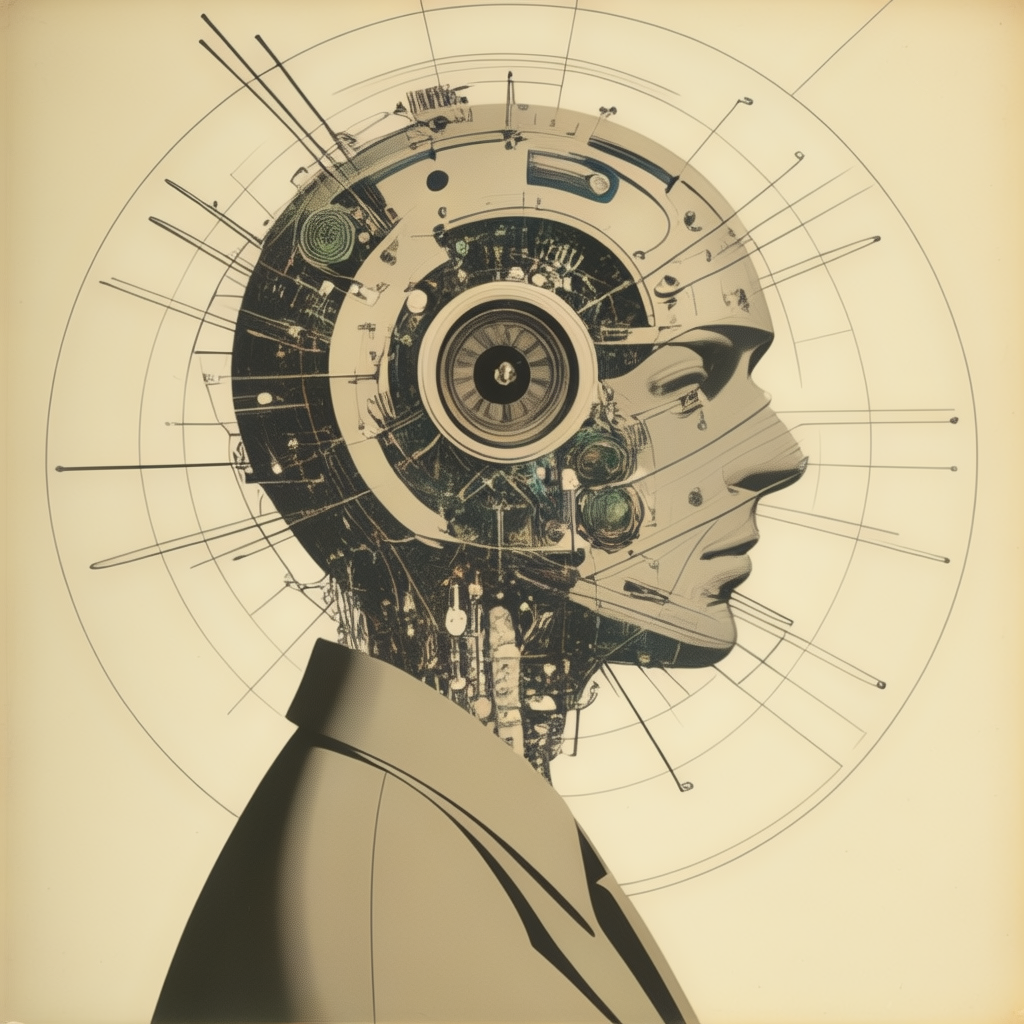In the realm of artificial intelligence (AI), few figures loom as large as Alan Turing, whose pioneering work laid the foundation for modern computing and reshaped our understanding of intelligence. In his seminal paper “Computing Machinery and Intelligence,” Turing introduced groundbreaking concepts such as the Turing test, machine learning, genetic algorithms, and reinforcement learning, revolutionizing the field and inspiring generations of researchers and innovators. Join us as we embark on a journey through Turing’s visionary ideas and their enduring impact on AI and technology.
Alan Turing’s groundbreaking paper “Computing Machinery and Intelligence” serves as a beacon of inspiration in the realms of computing and artificial intelligence (AI), introducing concepts that have reshaped our understanding of intelligence and computational capabilities. Beyond the seminal ideas of the Turing test, machine learning, genetic algorithms, and reinforcement learning, Turing’s work encapsulates a breadth of visionary insights that continue to drive innovation and exploration in the field. Let’s delve deeper into Turing’s multifaceted contributions and their enduring impact on the landscape of computing and intelligence.
The Turing Test: A Benchmark for Machine Intelligence
Alan Turing’s eponymous test, proposed in his 1950 paper, remains one of the most iconic concepts in AI. The Turing test challenges a machine’s ability to exhibit intelligent behavior indistinguishable from that of a human. By engaging in natural language conversations with a human evaluator, a machine aims to convince the evaluator of its human-like intelligence, thereby passing the test. This benchmark has spurred decades of research into natural language processing, conversational agents, and AI capabilities, shaping the development of chatbots, virtual assistants, and language models in the modern era.
Machine Learning: Unleashing the Power of Data
Turing’s insights into machine learning laid the groundwork for a paradigm shift in AI. By proposing the idea of “learning machines” capable of acquiring knowledge from data, Turing anticipated the rise of machine learning algorithms that underpin many AI applications today. From supervised learning techniques to unsupervised and reinforcement learning approaches, machine learning algorithms empower computers to recognize patterns, make predictions, and adapt to changing environments. Turing’s vision continues to drive innovations in predictive analytics, recommendation systems, autonomous vehicles, and personalized user experiences across diverse domains.
Genetic Algorithms: Evolutionary Computing at Its Core
In “Computing Machinery and Intelligence,”  introduced the concept of genetic algorithms, inspired by the principles of biological evolution. By simulating the process of natural selection and genetic variation, genetic algorithms enable computers to iteratively optimize solutions to complex problems. These algorithms mimic the evolutionary process of survival of the fittest, iteratively generating candidate solutions, evaluating their fitness, and evolving towards better solutions over successive generations. Turing’s pioneering work laid the groundwork for evolutionary computation, evolutionary robotics, and optimization techniques that find applications in engineering design, algorithmic trading, and problem-solving in dynamic environments.
introduced the concept of genetic algorithms, inspired by the principles of biological evolution. By simulating the process of natural selection and genetic variation, genetic algorithms enable computers to iteratively optimize solutions to complex problems. These algorithms mimic the evolutionary process of survival of the fittest, iteratively generating candidate solutions, evaluating their fitness, and evolving towards better solutions over successive generations. Turing’s pioneering work laid the groundwork for evolutionary computation, evolutionary robotics, and optimization techniques that find applications in engineering design, algorithmic trading, and problem-solving in dynamic environments.
Reinforcement Learning: Learning Through Interaction
Turing’s exploration of reinforcement learning anticipated a fundamental approach to AI learning inspired by behavioral psychology. Reinforcement learning algorithms enable agents to learn optimal behaviors by interacting with their environment, receiving feedback in the form of rewards or penalties. Through trial and error, agents learn to navigate complex decision-making tasks, such as game playing, robotics control, and autonomous decision-making. Turing’s insights into reinforcement learning continue to drive research into autonomous systems, adaptive control, and AI-driven decision-making, with applications ranging from self-driving cars to robotics and industrial automation.
Turing’s Enduring Legacy: Shaping the Future of AI
Alan Turing’s contributions to computing machinery and intelligence transcend mere technical innovations; they represent a profound philosophical exploration of the nature of intelligence and the capabilities of machines. Turing’s ideas continue to inspire researchers, engineers, and ethicists grappling with the challenges and opportunities of AI. As we navigate the complexities of AI ethics, responsible AI development, and the societal implications of intelligent technologies, Turing’s visionary insights serve as guiding beacons, reminding us of the importance of ethical AI, human-centered design, and the pursuit of AI for the benefit of humanity.
Formalization of Computation:
- Turing Machines: Turing’s conceptualization of the Turing machine, a theoretical model of computation, laid the groundwork for modern computing theory. Turing machines formalize the notion of algorithmic computation, providing a framework for understanding the limits and capabilities of computational systems.
- Universal Turing Machines: Turing’s notion of a universal Turing machine, capable of simulating any other Turing machine’s behavior, introduced the concept of programmable computers. This foundational idea paved the way for the development of general-purpose computers, enabling diverse applications beyond specific computational tasks.
Cryptography and Codebreaking:
- Enigma Machine: Turing’s pivotal role in breaking the German Enigma code during World War II showcased the power of computational methods in cryptography and intelligence operations. Turing’s insights into cryptanalysis and codebreaking techniques not only helped turn the tide of the war but also laid the groundwork for modern cryptography and cybersecurity practices.
- Cryptanalysis Techniques: Turing’s contributions to cryptanalysis extended beyond the Enigma machine, encompassing innovative methods for breaking cryptographic ciphers and deciphering encoded messages. His pioneering techniques, such as statistical analysis and pattern recognition, revolutionized the field of cryptanalysis and established principles still used in modern cryptographic systems.
Morphogenesis and Biological Computing:
- Morphogenetic Theory: Turing’s exploration of morphogenesis, the biological process by which organisms develop their shape and form, introduced the concept of reaction-diffusion systems. Turing’s mathematical models of morphogenetic patterns provided insights into the mechanisms underlying biological development and inspired research in artificial life and computational biology.
- Turing Patterns: Turing’s mathematical analysis of pattern formation in reaction-diffusion systems led to the discovery of Turing patterns, repetitive structures that emerge from the interaction of chemical substances. These patterns have applications in diverse fields, including developmental biology, pattern formation in nature, and the design of self-organizing systems.
Ethical and Philosophical Implications:
- The Turing Test Revisited: Beyond its technical significance, the Turing test sparked philosophical debates about the nature of intelligence, consciousness, and the potential for artificial minds. Turing’s probing questions about the criteria for intelligence and the possibility of machine consciousness continue to fuel discussions in AI ethics, philosophy of mind, and cognitive science.
- Ethical Considerations in AI Development: Turing’s work laid the groundwork for ethical considerations in AI development, highlighting the importance of responsible AI design, transparency, and accountability. Turing’s vision of AI as a tool for human empowerment and enrichment underscores the need for ethical frameworks that prioritize societal well-being and human values.
Turing’s Enduring Legacy:
Alan Turing’s contributions to computing and intelligence transcend technical innovations; they represent a profound exploration of the intersection of science, technology, and humanity. Turing’s visionary insights continue to inspire researchers, engineers, and thinkers across disciplines, shaping the trajectory of AI, computing, and society as a whole. As we honor Turing’s legacy, let us embrace the spirit of curiosity, innovation, and ethical responsibility, striving to harness the transformative power of technology for the betterment of humanity.
Quantum Computing Pioneering:
- Quantum Theory Applications: Turing’s early forays into quantum theory laid the groundwork for quantum computing, a revolutionary paradigm that leverages quantum phenomena to perform computations. While Turing’s direct contributions to quantum computing were nascent, his interdisciplinary approach and foundational work in computation provided essential building blocks for the field’s development.
- Quantum Complexity Theory: Turing’s insights into computational complexity, including the notion of Turing machines and the halting problem, laid the foundation for quantum complexity theory. This branch of theoretical computer science explores the computational capabilities and limitations of quantum computers, providing fundamental insights into the nature of computation in quantum systems.
Human-Computer Interaction Innovations:
- User Interface Design Principles: Turing’s exploration of human-computer interaction (HCI) principles anticipated modern approaches to user interface design. His emphasis on intuitive interaction, feedback mechanisms, and user-centered design foreshadowed the evolution of graphical user interfaces (GUIs), touchscreens, and other intuitive interfaces that define contemporary computing experiences.
- Accessible Computing: Turing’s advocacy for accessibility in computing underscores the importance of inclusive design practices that accommodate users with diverse abilities and needs. His vision of computing as a universally accessible tool for empowerment paved the way for innovations in assistive technologies, adaptive interfaces, and inclusive design methodologies.
Robotics and Autonomous Systems:
- Turing’s Mechanical Intelligence: Turing’s musings on machine intelligence extended to the realm of robotics and autonomous systems, envisioning machines capable of autonomous decision-making and adaptive behavior. While his contemporaneous technologies limited the realization of his vision, Turing’s ideas laid the groundwork for advancements in robotics, automation, and artificial agents.
- Robotic Learning Paradigms: Turing’s exploration of machine learning and reinforcement learning provided a theoretical basis for robotic learning paradigms. His conceptual framework for adaptive behavior and learning from experience inspired research into robotic autonomy, learning-based control systems, and robotic decision-making algorithms.
Ethical and Social Implications:
- AI Ethics and Governance: Turing’s ethical reflections on machine intelligence foreshadowed contemporary debates about AI ethics, responsible innovation, and societal impact. His recognition of the ethical implications of AI, including questions of agency, accountability, and bias, underscored the need for ethical frameworks and governance mechanisms to guide AI development and deployment.
- Social Impacts of Technology: Turing’s broader reflections on the social impacts of technology anticipated contemporary discussions about the role of technology in shaping society. His insights into the potential of computing to transform human relationships, communication, and social structures raised prescient questions about the societal implications of technological progress.
Turing’s Humanitarian Legacy:
Alan Turing’s legacy transcends the realm of technology, embodying a spirit of intellectual curiosity, innovation, and moral courage. His contributions to computing and intelligence, encompassing quantum theory, human-computer interaction, robotics, ethics, and social impact, reflect a deep commitment to advancing human knowledge and well-being. As we honor Turing’s legacy, let us draw inspiration from his visionary insights, guiding our pursuit of technology for the betterment of humanity and the advancement of knowledge.
In summary, Alan Turing’s visionary insights into computing and intelligence have left an indelible mark on the landscape of technology and human knowledge. From foundational concepts in computation to pioneering work in cryptography, morphogenesis, and AI ethics, Turing’s legacy serves as a beacon of inspiration for generations to come. As we navigate the complexities of the digital age, let us draw upon Turing’s wisdom and vision, guiding our endeavors towards a future enriched by the boundless possibilities of computing and intelligence.
In conclusion, Alan Turing’s seminal paper “Computing Machinery and Intelligence” stands as a testament to his visionary intellect and enduring legacy. By introducing concepts such as the Turing test, machine learning, genetic algorithms, and reinforcement learning, Turing sparked a revolution in AI that continues to shape our technological landscape. As we honor Turing’s legacy, let us embrace the spirit of curiosity, innovation, and ethical responsibility in our quest to unlock the full potential of artificial intelligence for the betterment of society.







